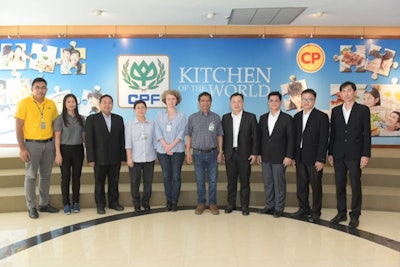
Charoen Pokphand Foods’ (CP Foods) compartment model has successfully restrained avian influenza (AI), and as a result, the World Organisation for Animal Health (OIE) will use Thailand and CP Foods as a model to encourage control of avian influenza in the region.
CP Foods was the first Thai company that applied the OIE’s compartmentalization principles as part of a key measure to shield the Asian country against the avian flu virus successfully, the company stated in a press release. The proactive measures of principles comprised of common biosecurity management, notifiable avian influenza (NAI) surveillance in compartments and buffer zones, and control measures of NAI in compartments, buffer zones and traceability systems. In addition, the principles have been implemented in buffer zones of one kilometer around farms to ensure distinct health status.
Payungsak Somyanontanakul, DVM, vice president and head of the CP Foods animal welfare committee, said the company has implemented the compartmentalization system which strongly prevents the spread of avian influenza, particularly in broiler chicken and duck integration. It also guarantees food safety of consumers since the flu virus was wider spread in Thailand in 2004. Moreover, it has joined hands with the Department Livestock Development (DLD) to develop risk analysis for bird flu in line with Hazard Analysis Critical Control Points (HACCP). The practice was drawn to ensure precisely disease assessment.
“Despite a lack of certification, former EU Commissioners, representatives of the World Health Organization, OIE and other health organizations have praised CP Foods’ compartmentalization procedures that supported national AI-free strategies and ensuring our CP Foods products are free of the virus. Thailand was also a pilot country in the region to launch OIE compartmentalization and successfully established to control avian influenza,” said Payungsak.
With the compartmentalization, it encourages traceability practices throughout the supply chain. The company also further develops the compartment system to prevent emerging diseases at poultry farms, to preserve international trade.
For sustainable biosecurity, CP Foods has also promoted the compartment system to its contracted farmers, who will be trained by veterinarian and experts from DLD.
Payungsak added that OIE representatives recently visited the company from feed mill to processing plant in Nakhon Ratchasima to learn more on CP Foods’ successful compartment model. They will raise this model as a case study in the Southeast Asia workshop on compartmentalization organized by OIE. The workshop is drawn to establish disease-free poultry, particularly avian influenza in the region.
So far, CP Foods has extended the system to create higher quality meat through “Benja Chicken,” which uses compartmentalization and is raised without antibiotics. This premium product is raised to serve health-conscious consumers.















